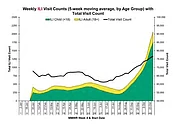11/22/2022

Houston is seeing a spike in influenza cases several months earlier than in previous years. Late August was when the first cases started trickling into the region. That's compared to the last flu season, which began in February.
The number of cases are increasing as the holidays approach as 3.4 percent of reported doctors visits in Harris County during the first week of November were related to the flu or other respiratory viral infections, according to the most recent report from the Houston Health Department. That's up from 1.7 percent in early October.
Children have been bearing the brunt of these flu cases. Ninety-two percent of doctors visits that ended up in a flu diagnosis were in children under the age of 18. There have been over 16,000 diagnoses in October and early November.
Dr. Janeana White, the health department's deputy local health authority, said children weren't given much opportunity to build immunity during the isolation of the COVID-19 pandemic.
"The past couple of years, we've really hunkered down — children weren't in school settings and daycare facilities," White said. "Most kids get exposed to RSV under the age of 2. We're now starting to see individuals who really weren't exposed to some of these viruses more robustly getting exposed."
White said there are multiple respiratory viruses circulating in the region to be aware of: Respiratory Syncytial Virus (RSV), COVID-19, parainfluenza and rhinovirus.
RSV, in particular, has been puzzling pediatricians this year. A surge of cases hit the region in the spring and yet again this fall.
"We are seeing transmission of RSV among children," Dr. James Versalovic with Texas Children's Hospital said in an interview in early October. "What’s different this year is that now we’ve seen this twice. It is certainly unusual in terms of a second round of RSV."
Versalovic said spikes in RSV were easy to predict before 2020 — cases typically go up once a year in late fall and early winter. The year 2022 has defied those patterns.
"We know that these transmission patterns have been more dynamic during the pandemic and it’s not been limited to COVID-19," Versalovic said. "RSV has been equally difficult to predict during this pandemic. It’s been a highly dynamic period for respiratory viruses in general."
White said the best way to protect yourself from a bad case is to get the available vaccines. COVID-19 boosters and flu shots are available at most pharmacies. The flu vaccine takes up to two weeks before it becomes fully effective.
She is recommending tried and true precautions from the pandemic — handwashing, wearing masks, rapid testing before events and surface cleaning.
"We should think about how we’re looking at events over this holiday season, the amount of people that we’re gathering with and really how to safely plan our travels during this holiday season," White said.

